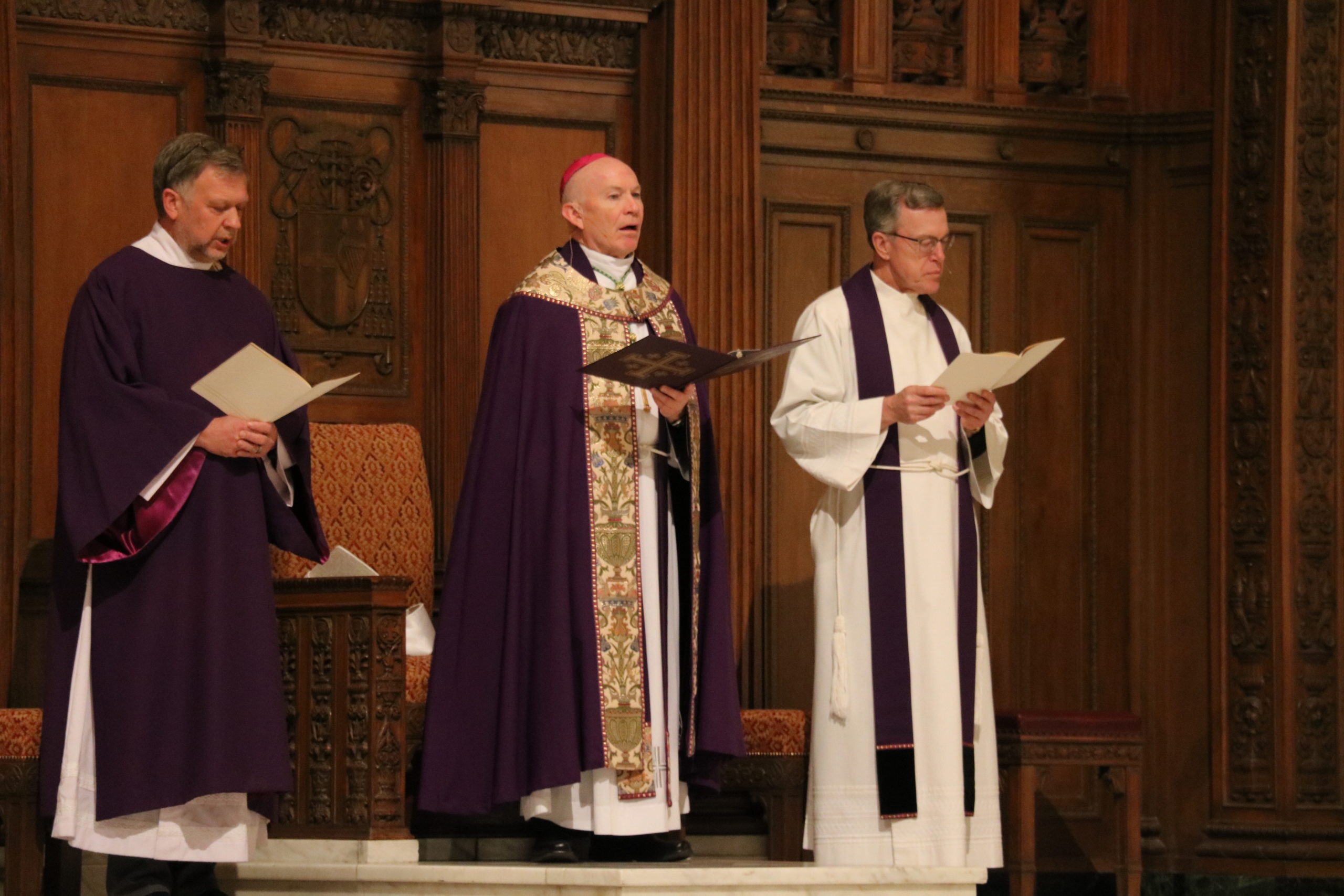
Archbishop George J. Lucas prays for victims of sexual and other forms of abuse during a prayer service Dec. 5, 2017, at St. Cecilia Cathedral in Omaha. He was joined by Deacon Mark White of St. Matthew the Evangelist Parish in Bellevue, left, and Father Michael Grewe, pastor of St. Cecilia Parish and rector of St. Cecilia Cathedral. Another such prayer service is planned for April 15 at St. Leo the Great Church in Omaha, where the archbishop also will preside. MIKE MAY/STAFF
News
Prayer service, other events to help abuse victims heal
March 22, 2021
The Archdiocese of Omaha is committed to providing hope, compassion, mercy and resources for healing to those who have suffered clergy abuse.
Pursuant to that mission, it has planned a Prayer for Healing service for abuse victims and their loved ones, including a Litany of Healing, said Mary Beth Hanus, director of the archdiocese’s Victim Outreach and Prevention Office.
Archbishop George J. Lucas will conduct the service, which is dedicated to survivors of any kind of abuse, at St. Leo the Great Church in Omaha on April 15 at 7 p.m.
Similar services were held in 2017 and 2019, and plans are for them to become annual events.
In addition to the service, Hanus wants victims to know that a call to her office can be the beginning of the healing process.
Victims are welcome to come forward with any kind of abuse allegation, regardless of when it occurred, she said.
“We welcome those who have been injured by clergy and Church personnel, but also … anybody that has had any kind of abuse in their life,” she said.
“What we know is (abuse) affects who you are in your relationship with God. He is present and is trying to be with you there in that trauma, but trauma injures (the relationship).”
In 2002, the United States Conference of Catholic Bishops (USCCB) set specific requirements for dioceses to eliminate clerical abuse through its “Charter for the Protection of Young People.” These include reporting and investigating complaints, and continuous efforts to protect children through safe environment training of youths, plus parish and school personnel.
Two years later the archdiocese established its Victim Outreach and Prevention Office and hired Hanus as its head. Each year the archdiocese has been found to be in compliance with the charter through an independent audit.
‘COMPASSIONATE ARM’
Hanus likens her office’s ministry to “the compassionate arm of the Church, which is really the compassion arm of Archbishop Lucas.”
She believes her ministry to both victims and pastors dovetails “very beautifully” with Archbishop Lucas’ pastoral vision of “one Church: encountering Jesus, equipping disciples and living mercy” and the archdiocese’s recently announced “big goal” of building parishes into missional communities over the next six years.
“When you tend to think of the mission of the big goal and of living mercy, you think of a corporal kind of mercy … helping people with tangibles – food, rent, clothing,” she said.
“But there’s another level and that’s when people’s souls and hearts have been injured and they are kind of on the outskirts of the Church because of what happened to them.”
Hanus’ most recent work, in conjunction with the big goal, has consisted in building relationships, especially with pastors, to help them establish a welcoming and compassionate environment to encourage abuse victims to come forward.
One suggestion was the removal of pictures, plaques and nameplates of individuals listed on the 2018-19 clergy abuse report to eliminate triggers that could retraumatize victims.
“What we know is (trauma and abuse) affects generations of faith,” Hanus said. “Even though it is maybe historical, and maybe it’s been 20 years, there is still that undercurrent of hurt or mistrust.”
NEVER TOO LATE
Most importantly, Hanus wants victims to know it’s never too late to come forward, and that they can trust that the outreach will help them.
“We call law enforcement, even if it’s been 50 years and the abuser is dead, as a way to recognize that this was a crime,” she said.
“We’ve had three men in their late 70s or 80s come forward that had never (done so) before. One of them is now in counseling. In one case, a man told her that he did not want to take the abuse and trauma to the grave.
“And so, here they are at 80 years old and it happened when they were teenagers,” she said. “They’ve held it all that time and it was the first they had spoken of it.”
‘THE WAY’ RETREAT
Victims of trauma can also attend an upcoming “The Way” retreat, a three-day, guided healing meditation and prayer experience for those whose abuse by another has deeply affected their heart, mind, body and soul.
To be held at St. Benedict Center in Schuyler, the retreat is a collaborative effort among Nebraska’s three Catholic dioceses.
Last years’ retreats were postponed due to COVID-19, but the retreats are rescheduled for this summer: a women’s retreat July 23-25 organized by Hanus, and a men’s retreat Oct. 1-3 organized by Beth Heidt Kozisek, Ph.D., of the Grand Island diocese.
The application deadline is July 1; cost is $250 and includes private room, meals, retreat materials and program.